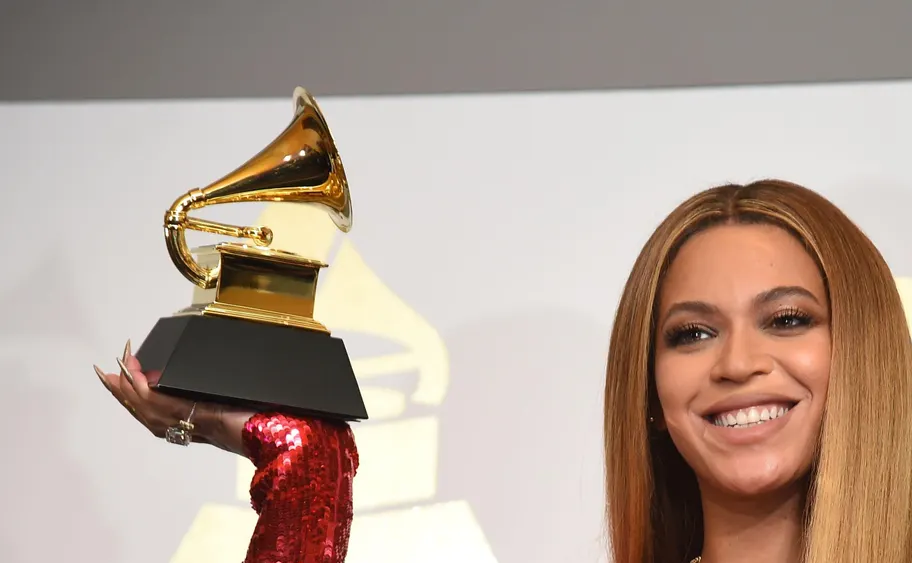Beyonce poses with her Grammy trophies in the press room during the 59th Annual Grammy Music Awards.
AFP via Getty Images
Beyoncé recently won a Grammy for “Album of the Year,” a well-deserved moment that sparked much debate and speculation. By winning Album of the Year for Cowboy Carter, Beyoncé became the first Black woman in the 21st century to receive that honor, an accolade last claimed 26 years ago by Lauryn Hill for The Miseducation of Lauryn Hill, following earlier wins by Natalie Cole and Whitney Houston.
The most talked-about Grammy win was not only an important milestone for the singer but an important moment for the music industry. The win challenged certain industry biases and set a new standard for what recognition should look like. In the history of award shows, many have proven to be complicated and controlled by industry biases, voting systems and external influences. But this particular win was closely monitored by industry critics and fans who believed that it was about time that the “Crazy in Love” singer took home the accolade.
Beyoncé performs onstage during the “RENAISSANCE WORLD TOUR” at SoFi Stadium in Inglewood, … [+] California.
WireImage for Parkwood
Beyoncé’s career is a masterclass in the art and occasional absence of recognition. With 35 Grammy Awards and a trail of record-making nominations, she is arguably the most influential artist in modern music history. But, up until this moment and for all her awards, there is also a pattern of losses that have triggered heated debates, raised important questions about bias, and ultimately taught us invaluable lessons about how we view and value our work. A look at Beyoncé’s history with the Grammy Awards shows moments of snubbed credit that offer insights about the music industry and the nature of recognition at work. It also showed that recognition is rarely a straightforward reflection of talent or effort. Instead, it is a tricky interplay of artistry, timing, industry politics and sometimes the limitations of traditional evaluation metrics. However, the history of Beyoncé’s wins and losses is one of grit, innovation and the boldness to remain authentic, even when the awards may not always come.
Beyoncé accepts Best Dance/Electronic Music Album for “Renaissance” onstage during the 65th GRAMMY … [+] Awards at Crypto.com Arena in Los Angeles, California.
Getty Images for The Recording Academy
Victories and notable setbacks have punctuated Beyoncé’s career. Early in her solo career, the “Texas Hold ‘Em” singer released albums that would reimagine R&B and pop music. Her debut solo album, Dangerously in Love, earned her five Grammy Awards, tying her with other iconic female artists for the most wins in a single ceremony. Throughout her career, she continued to earn awards for her work. Yet despite her impressive Grammy tally, there had been a constant narrative around her losses in the Album of the Year category.
The Politics of Recognition
Beyoncé was nominated for the Grammys’ most prestigious prize for decades but was passed over to winners such as Taylor Swift, Beck, Adele and Harry Styles. It wasn’t until her 2024 country-inspired album Cowboy Carter that she finally broke that barrier, winning Album of the Year and Best Country Album in a ceremony that honored a historic first and a long-awaited vindication. This bittersweet history—of being celebrated repeatedly in many categories while continually missing out on one of the most significant awards—shows an important truth: even the most brilliant work can sometimes be misunderstood or under-appreciated by traditional gatekeepers.
Awards shows like the Grammys have been designed to celebrate artistic excellence, yet they are not immune to the politics that comes with any voting system. When Beyoncé’s I Am… Sasha Fierce, Beyoncé, Lemonade and Renaissance lost in 2008, 2013, 2016 and 2022, respectively, many critics viewed the losses as evidence of a system that is slow to embrace innovative forms of art.
Beyoncé looks on during a campaign rally with Democratic presidential nominee, U.S. Vice President … [+] Kamala Harris, at Shell Energy Stadium in Houston, Texas.
Getty Images
Even her husband Jay-Z’s pointed remarks during a previous ceremony—calling out the Recording Academy for the paradox of Beyoncé having more Grammys than any other artist while still being denied the top honor—showed how awards can sometimes serve as a mirror to systemic issues. His comments showed a disconnect: how can an artist, whose work connects so powerfully across genres and eras, be constantly ignored in a category many believe is the ultimate measure of artistic greatness? For Beyoncé, each Grammy win has been a moment of validation that is proof of her pursuit of excellence. Her wins across many genres, including R&B, pop and even country, demonstrate her artistic versatility and overall appeal. When Cowboy Carter won Album of the Year last night, it was a milestone that challenged entrenched notions about what constitutes “country” music, proving that innovative artistry can go beyond traditional boundaries.
Lessons for Our Own Work and Careers
Beyoncé’s Album of the Year Grammy win holds powerful lessons for anyone pursuing excellence in their career. It is proof that recognition can be delayed even for the hardest workers. But this delay is not necessarily a reflection of the quality of your work but a sign that change and progress can take time. As opposed to allowing a loss to reduce our sense of self-worth and confidence, we can consider it constructive feedback, a sign that perhaps our work is ahead of its time or that there is room for growth.



